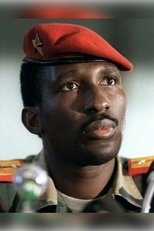Thomas Sankara
- Teen actor
Thomas Isidore Noël Sankara (Yako, December 21, 1949 – Ouagadougou, October 15, 1987) was a military officer, Marxist revolutionary, Pan-Africanist, and political leader of Burkina Faso. He was a popular captain and the Prime Minister when the country was still called the Republic of Upper Volta. Shortly thereafter, he became the fifth Voltan president since the liberation from French rule and the first president of Burkina Faso.
See more on
Acted in
Laissez-faire
2015
as Self (archive footage)
Concerning Violence
2014
as Self - President of Burkina Faso (archive footage)
Sankara ... And That Day They Killed Happiness
2013
Capitaine Thomas Sankara
2012
as Self (archive footage)
Thomas Sankara: The Upright Man
2006
as Self (archive footage)
Thomas Sankara
1991







